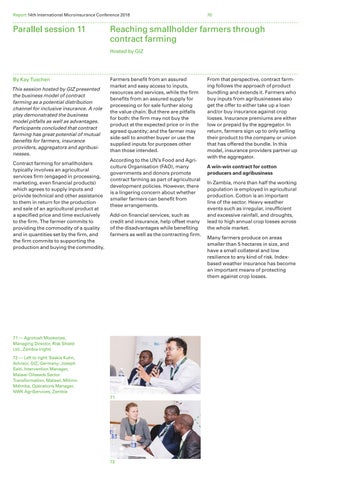Report 14th International Microinsurance Conference 2018
Parallel session 11
70
Reaching smallholder farmers through contract farming Hosted by GIZ
By Kay Tuschen This session hosted by GIZ presented the business model of contract farming as a potential distribution channel for inclusive insurance. A role play demonstrated the business model pitfalls as well as advantages. Participants concluded that contract farming has great potential of mutual benefits for farmers, insurance providers, aggregators and agribusinesses. Contract farming for smallholders typically involves an agricultural services firm (engaged in processing, marketing, even financial products) which agrees to supply inputs and provide technical and other assistance to them in return for the production and sale of an agricultural product at a specified price and time exclusively to the firm. The farmer commits to providing the commodity of a quality and in quantities set by the firm, and the firm commits to supporting the production and buying the commodity.
Farmers benefit from an assured market and easy access to inputs, resources and services, while the firm benefits from an assured supply for processing or for sale further along the value chain. But there are pitfalls for both: the firm may not buy the product at the expected price or in the agreed quantity; and the farmer may side-sell to another buyer or use the supplied inputs for purposes other than those intended. According to the UN’s Food and Agriculture Organisation (FAO), many governments and donors promote contract farming as part of agricultural development policies. However, there is a lingering concern about whether smaller farmers can benefit from these arrangements. Add-on financial services, such as credit and insurance, help offset many of the disadvantages while benefiting farmers as well as the contracting firm.
71 — Agrotosh Mookerjee, Managing Director, Risk Shield Ltd., Zambia (right) 72 — Left to right: Saskia Kuhn, Advisor, GIZ, Germany; Joseph Saiti, Intervention Manager, Malawi Oilseeds Sector Transformation, Malawi; Milimo Mdimba, Operations Manager, NWK AgriServices, Zambia 71
72
From that perspective, contract farming follows the approach of product bundling and extends it. Farmers who buy inputs from agribusinesses also get the offer to either take up a loan and/or buy insurance against crop losses. Insurance premiums are either low or prepaid by the aggregator. In return, farmers sign up to only selling their product to the company or union that has offered the bundle. In this model, insurance providers partner up with the aggregator. A win-win contract for cotton producers and agribusiness In Zambia, more than half the working population is employed in agricultural production. Cotton is an important line of the sector. Heavy weather events such as irregular, insufficient and excessive rainfall, and droughts, lead to high annual crop losses across the whole market. Many farmers produce on areas smaller than 5 hectares in size, and have a small collateral and low resilience to any kind of risk. Indexbased weather insurance has become an important means of protecting them against crop losses.























